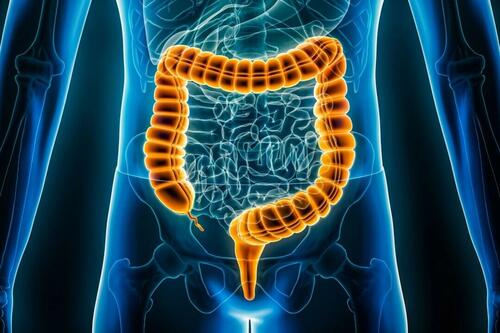
Authored by Mary West via The Epoch Times (emphasis ours),
A recent study from Lund University in Sweden has unveiled a more straightforward path to taming irritable bowel syndrome (IBS). Eating less starch and sugar, which describes an eating plan called the starch- and sucrose-reduced diet (SSRD), not only matches the popular low-FODMAP diet in symptom relief but also proved superior in promoting weight loss and curbing sugar cravings.

Earlier research suggests that the SSRD is associated with other health advantages, and the low-FODMAP diet has some drawbacks.
Study Compares IBS Treatment Diets
IBS refers to a group of symptoms—primarily abdominal pain, diarrhea, and constipation—that occur without any visible signs of damage to the digestive tract. While the low-FODMAP diet has been the established dietary treatment, a study published in Nutrients in September compares it with an alternative approach. A low-FODMAP diet restricts the intake of certain carbohydrates, including wheat, lactose, fructose, rye, and barley.
In earlier research, SSRD showed promise for reducing IBS symptoms. However, the Nutrients study marks the first direct comparison between SSRD and the low-FODMAP diet.
“We launched this study in 2022 to compare SSRD and Low FODMAP,” Bodil Ohlsson, a professor at Lund University and co-author of the study, said in a press release. The study participants included 155 people with IBS, randomly assigned to follow either the SSRD or low-FODMAP diet for four weeks. At the beginning of the trial, they were not on any particular diet.
The results showed that both diets improved IBS symptoms by 75 percent to 80 percent. Also, at the end of the experiment, the participants in the SSRD group experienced more weight loss and fewer sugar cravings than those in the low-FODMAP group.
SSRD Versus Low-FODMAP Diet
FODMAP stands for fermentable oligo-, di-, monosaccharides and polyols, short-chain carbohydrates resistant to digestion. Doctors recommend the low-FODMAP diet for IBS because high-FODMAP foods tend to produce gas and alter bowel habits.
Despite this advantage, the low-FODMAP diet has the following drawbacks:
- The low-FODMAP diet excludes many nutritious fruits and vegetables, so restricting these foods in the diet may lead to deficiencies in vitamins and minerals, reported a clinical trial published in the Journal of the Academy of Nutrition and Dietetics.
- The diet restricts prebiotics—high-fiber foods that increase the beneficial bacterial strains in the gut—potentially harming the gut microbiome.
- Some people complain about the complexity of the low-FODMAP diet, as it has an extensive list of foods to avoid.
In contrast with the low-FODMAP diet, the SSRD focuses on decreasing sucrose, starch, and added sugar. According to Ohlsson, it is healthy and simple.
“We wouldn’t really even call SSRD a diet,” she said in the press release. “It’s how everyone should eat, not just those with IBS,” Ohlsson added. “And unlike the low FODMAP diet, SSRD is easy to understand and easier to follow. You can eat everything when you are invited to dinner, just less of certain things. If you rest your stomach for the rest of the week, you can indulge a little one day!”
Why SSRD Offers Advantages
An array of mechanisms may underlie the positive effects of SSRD, Ohlsson told The Epoch Times in an email.
One factor may involve a rare deficiency in sucrase-isomaltase, an enzyme that breaks down sugar and starch. “Congenital sucrase-isomaltase deficiency is a genetic disease leading to gastrointestinal symptoms in children,” she said. “Increased prevalence of rare variants of sucrase-isomaltase genes has been found in IBS patients, which aligns with improvement of gastrointestinal symptoms by SSRD.”
Another potential mechanism relates to gut microbiota composition. Excess undigested carbohydrates in the bowel can lead to increased fluid secretion, Ohlsson said. The microbiota breaks down the food, leading to gas production. These effects lead to bloating, flatulence, pain, and diarrhea. Since the SSRD reduces carbohydrate intake, it decreases the symptoms that ensue.
“Additionally, the weight reduction may also lead to improved symptoms,” she added. “Fat tissue produces inflammatory and hormonal substances, so weight loss leads to reduced secretion of such substances. This may lead to less symptoms by reducing a low-grade inflammation.”
The benefits of SSRD in reducing weight and sugar cravings may partly stem from sugar’s low satiety effect, Ohlsson noted. Ingesting sugar leads to the intake of calories with less satiety, resulting in eating more. In contrast, ingesting fat promotes satiety, resulting in eating less. Thus, high sugar consumption results in consuming many more calories.
Following the SSRD
A 2021 study published in Nutrients outlines guidelines for following the SSRD.
The diet recommends increasing the intake of the following:
- Nonstarchy fruits and vegetables
- Meat and fish
- Dairy products without added sugar
- Butter and oil
- Fiber-rich grains such as oats, brown rice, and 100 percent whole-grain bread
- Nuts and seeds
The SSRD also involves avoiding the following:
- Starchy fruits such as bananas
- Starchy vegetables such as potatoes, corn, and beans
- Oat and soy milk
- Margarine
- Refined grains and processed breakfast cereals
- Sugary snacks and beverages
A Gastroenterologist Weighs In
How might the findings from the recent Nutrients study be received in the real world of gastroenterology practice?
Dr. Ashkan Farhadi, a board-certified gastroenterologist at MemorialCare Orange Coast Medical Center in Fountain Valley, California, shared his thoughts in an email interview with The Epoch Times.
He said he found the study very interesting due to the known drawbacks of the low-FODMAP diet and the potential additional benefits of the SSRD. “While there is no question that the low-FODMAP diet works, it is extremely restrictive,” he said. “In fact, most of my patients are not able to handle the low FODMAP because it deprives them of many fruits and vegetables.
“So I’m really happy to have an alternative that is actually very appealing, as nowadays, people are doing low starch and sugar for a variety of reasons,” Farhadi added.
Authored by Mary West via The Epoch Times (emphasis ours),
A recent study from Lund University in Sweden has unveiled a more straightforward path to taming irritable bowel syndrome (IBS). Eating less starch and sugar, which describes an eating plan called the starch- and sucrose-reduced diet (SSRD), not only matches the popular low-FODMAP diet in symptom relief but also proved superior in promoting weight loss and curbing sugar cravings.

Earlier research suggests that the SSRD is associated with other health advantages, and the low-FODMAP diet has some drawbacks.
Study Compares IBS Treatment Diets
IBS refers to a group of symptoms—primarily abdominal pain, diarrhea, and constipation—that occur without any visible signs of damage to the digestive tract. While the low-FODMAP diet has been the established dietary treatment, a study published in Nutrients in September compares it with an alternative approach. A low-FODMAP diet restricts the intake of certain carbohydrates, including wheat, lactose, fructose, rye, and barley.
In earlier research, SSRD showed promise for reducing IBS symptoms. However, the Nutrients study marks the first direct comparison between SSRD and the low-FODMAP diet.
“We launched this study in 2022 to compare SSRD and Low FODMAP,” Bodil Ohlsson, a professor at Lund University and co-author of the study, said in a press release. The study participants included 155 people with IBS, randomly assigned to follow either the SSRD or low-FODMAP diet for four weeks. At the beginning of the trial, they were not on any particular diet.
The results showed that both diets improved IBS symptoms by 75 percent to 80 percent. Also, at the end of the experiment, the participants in the SSRD group experienced more weight loss and fewer sugar cravings than those in the low-FODMAP group.
SSRD Versus Low-FODMAP Diet
FODMAP stands for fermentable oligo-, di-, monosaccharides and polyols, short-chain carbohydrates resistant to digestion. Doctors recommend the low-FODMAP diet for IBS because high-FODMAP foods tend to produce gas and alter bowel habits.
Despite this advantage, the low-FODMAP diet has the following drawbacks:
- The low-FODMAP diet excludes many nutritious fruits and vegetables, so restricting these foods in the diet may lead to deficiencies in vitamins and minerals, reported a clinical trial published in the Journal of the Academy of Nutrition and Dietetics.
- The diet restricts prebiotics—high-fiber foods that increase the beneficial bacterial strains in the gut—potentially harming the gut microbiome.
- Some people complain about the complexity of the low-FODMAP diet, as it has an extensive list of foods to avoid.
In contrast with the low-FODMAP diet, the SSRD focuses on decreasing sucrose, starch, and added sugar. According to Ohlsson, it is healthy and simple.
“We wouldn’t really even call SSRD a diet,” she said in the press release. “It’s how everyone should eat, not just those with IBS,” Ohlsson added. “And unlike the low FODMAP diet, SSRD is easy to understand and easier to follow. You can eat everything when you are invited to dinner, just less of certain things. If you rest your stomach for the rest of the week, you can indulge a little one day!”
Why SSRD Offers Advantages
An array of mechanisms may underlie the positive effects of SSRD, Ohlsson told The Epoch Times in an email.
One factor may involve a rare deficiency in sucrase-isomaltase, an enzyme that breaks down sugar and starch. “Congenital sucrase-isomaltase deficiency is a genetic disease leading to gastrointestinal symptoms in children,” she said. “Increased prevalence of rare variants of sucrase-isomaltase genes has been found in IBS patients, which aligns with improvement of gastrointestinal symptoms by SSRD.”
Another potential mechanism relates to gut microbiota composition. Excess undigested carbohydrates in the bowel can lead to increased fluid secretion, Ohlsson said. The microbiota breaks down the food, leading to gas production. These effects lead to bloating, flatulence, pain, and diarrhea. Since the SSRD reduces carbohydrate intake, it decreases the symptoms that ensue.
“Additionally, the weight reduction may also lead to improved symptoms,” she added. “Fat tissue produces inflammatory and hormonal substances, so weight loss leads to reduced secretion of such substances. This may lead to less symptoms by reducing a low-grade inflammation.”
The benefits of SSRD in reducing weight and sugar cravings may partly stem from sugar’s low satiety effect, Ohlsson noted. Ingesting sugar leads to the intake of calories with less satiety, resulting in eating more. In contrast, ingesting fat promotes satiety, resulting in eating less. Thus, high sugar consumption results in consuming many more calories.
Following the SSRD
A 2021 study published in Nutrients outlines guidelines for following the SSRD.
The diet recommends increasing the intake of the following:
- Nonstarchy fruits and vegetables
- Meat and fish
- Dairy products without added sugar
- Butter and oil
- Fiber-rich grains such as oats, brown rice, and 100 percent whole-grain bread
- Nuts and seeds
The SSRD also involves avoiding the following:
- Starchy fruits such as bananas
- Starchy vegetables such as potatoes, corn, and beans
- Oat and soy milk
- Margarine
- Refined grains and processed breakfast cereals
- Sugary snacks and beverages
A Gastroenterologist Weighs In
How might the findings from the recent Nutrients study be received in the real world of gastroenterology practice?
Dr. Ashkan Farhadi, a board-certified gastroenterologist at MemorialCare Orange Coast Medical Center in Fountain Valley, California, shared his thoughts in an email interview with The Epoch Times.
He said he found the study very interesting due to the known drawbacks of the low-FODMAP diet and the potential additional benefits of the SSRD. “While there is no question that the low-FODMAP diet works, it is extremely restrictive,” he said. “In fact, most of my patients are not able to handle the low FODMAP because it deprives them of many fruits and vegetables.
“So I’m really happy to have an alternative that is actually very appealing, as nowadays, people are doing low starch and sugar for a variety of reasons,” Farhadi added.
Loading…




